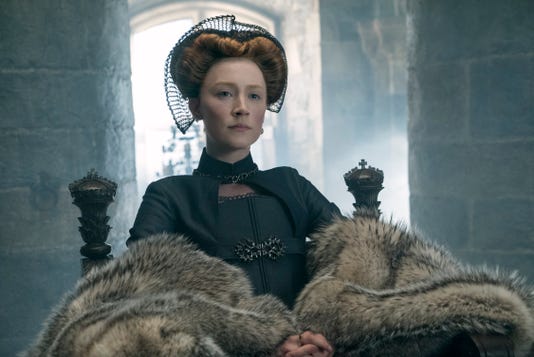Josie Rourke's Mary, Queen of Scots seems fated to suffer at the hands of two separate phenomena. Financially, its nemesis will be The Favourite, the much-laurelled Yorgos Lanthimos romp that treats British history, and broader historical decorum, as a joke. Set against that, Rourke's film is very much costume-drama trad, with reams of explanatory title cards, sweeping helicopter shots of the Highland countryside, and hundreds of rhubarbing extras crammed into its court scenes or going at one another on the battlefield. That kind of movie has its own audience, of course, but it now risks being received as fustier than it already was. Dramatically, the film suffers from what we can define as the Brexit effect. The constitutional crisis it outlines proves far less compelling than our present moment; even during its more turbulent stretches, you may well find yourself tempted to check your phone to see if anybody else has resigned, or whether anything's been resolved. One countermeasure Rourke and writer Beau Willimon deploy is to push for other forms of relevance, recruiting a youthful cast (barely a face over 40 in the leads) and making grand, more than faintly anachronistic gestures towards inclusiveness. This Mary (Saoirse Ronan) has been retconned to serve as a proto-feminist figurehead, a brave single mother who tells her giggling sorority of pansexual, crossdressing courtiers "be whoever you want among us". You've heard of Drunk History; here, for better or worse, is Woke History.
One can appreciate these gestures, particularly in a field that has generally been as whitebread-vanilla as they come, but they raise questions about what we want from our historical drama. Do we want to see the world as it was, or as we would prefer it to have been? Rourke's film stumbles through a peculiar halfway house where it's hard to believe in the reality of what's been set before us, let alone get unduly caught up in it. If Simon Schama doesn't have a heart attack during the scene where Mary lifts her skirts to persuade man-hungry Lord Darnley (Jack Lowden) to go at her from behind, he may succumb to conniptions at the later hook-up in which the dashing Lord goes down on m'lady and refuses any reciprocal arrangement. This weird, distracting fascination with Ye Olde Bedroom Activity means the movie's notional central conflict - two women with much in common, separated by men, religion and a softish border - is never allowed to come into clear dramatic focus. Willimon proves less interested in defining the stakes involved in the battle of wills between Mary and Margot Robbie's Elizabeth - why it mattered that the queens produced an heir - than in describing the means by which they ended up with child; no wonder the feminist gloss he puts on this period ("Sisters do not abandon sisters") should be rendered flimsy-seeming by the final development, which actually dates from history. The narrative arc shows up the film's contemporary trimmings for the high-heaped horseshit they are.
Unswayed by the storytelling, one ends up sorting actors, picking sides, and it soon becomes apparent that the Scottish half is a good deal stronger than the English half. Ronan at least holds down her corner of the screen, giving sporadic ballast to Willimon's idea of a Thoroughly Modern Mary, and Rourke surrounds her with seasoned performers who wear the facial hair well: Ian Hart as a grim-visaged adviser, Martin Compston as a chancer who moves in from the margins late on, and especially David Tennant, who makes John Knox, the rabble-rousing Protestant preacher apparently styled after Rasputin, the movie's most fascinating figure. Down south, alas, we're stranded in the none too winning company of a pox-scarred Robbie (as lamentably cast here as she was in Goodbye Christopher Robin) and a toadying Guy Pearce as Cecil. (The distance between first- and second-billed stars may be the biggest this decade: I longed for a Heat-style treatment, more closely pairing two symbiotic rulers who may have been better matched to one another than anyone else around. It couldn't be any more preposterous than Willimon's Age of Aquarius stylings.) Put 'em together, and you wind up with one of those puzzling misfires that occasionally catches the eye and fires the imagination, never quite the Sunday-afternoon snooze it threatens to be, because it is making choices, however misguided. (And some of its craft choices - Max Richter's stirring score, John Mathieson's burnished, period-appropriate photography - are actually better than sound.) Perhaps there was an earlier draft of this script, a less right-on cut, that did everything we'd want a Mary, Queen of Scots movie to do in 2019. The one that's ended up on screen doesn't quite.
Mary, Queen of Scots opens in cinemas nationwide on Friday.

No comments:
Post a Comment